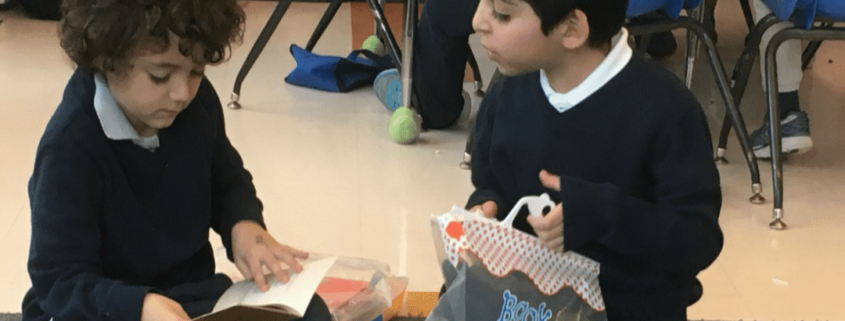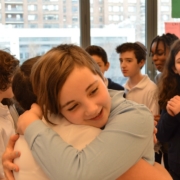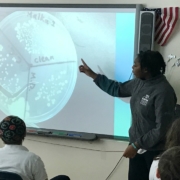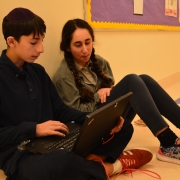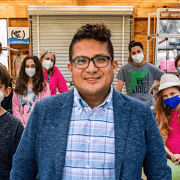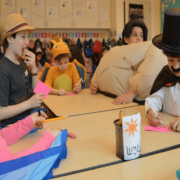16 Feb More than the ABCs: Early Literacy at Schechter Manhattan
The Gan students were sitting in two circles, excited for their publishing party. Each circle included classmates, their teachers, and several other adults from around the school. These proud 5- and 6-year-old authors were presenting the nonfiction books that they had written. Each book was bound, beautifully illustrated, and included three or four carefully written pages, each with a few words, plus an “about the author” page. After listening intently to their friends, each child then had an opportunity to share a warm comment or ask a question of the author.
Important early literacy experiences, like this publishing party, take place every day in Schechter Manhattan kindergarten and first-grade classrooms. Learning to read and write are complex tasks that, for most children, do not happen by themselves. The classroom teachers work thoughtfully to create a vibrant learning environment that supports the growth of each child’s literacy skills in these crucial early foundational years. When young children begin to read, they must understand how books “work:” the difference between text and pictures, and between letters, words, and sentences. They have to figure out how to decode and make meaning from the words that they read. Strategies such as visualization, making connections and understanding elements of a story help increase students’ comprehension of what they are reading. Our approach to teaching literacy is a balanced one– it includes both authentic interaction with literature and language through Reading and Writing Workshop, and direct, explicit instruction in phonics through the Fundations program. This balanced approach to teaching reading and writing naturally and intentionally promotes literacy skills in all areas.
Reading and Writing Workshop in our early childhood classrooms provide students with a wide variety of authentic experiences in reading, writing, and oral language. In Reading and Writing Workshop, teachers demonstrate or model a concept or skill, then students practice the concept or skill with teacher support, and then directly apply it to their work. In Reading Workshop, teachers engage students in conversations about reading and listen carefully as they share their favorite books, special reading spots, and connections that they make between books and the world around them. Teachers use this knowledge about their students to develop units and lessons that introduce the children to skills and strategies that will help them become proficient and thoughtful readers. For example, in a first-grade reading lesson, a teacher will read a book out loud to students and model reading behaviors by pausing and “thinking out loud” about an idea or wondering about the meaning of a word. Students then practice the skills with a partner or independently, using texts appropriate for them.
Through Fundations, the phonics program in our kindergarten and first-grade classrooms, our young readers learn all about letters, their sounds, and how to form them, along with strategies for segmenting and blending words as they try to read and spell them. They also learn about word and sentence structure and practice reading with fluency. While students are reading during reading workshop, teachers circulate throughout the room and conference with individual students to help them apply both the phonics and comprehension skills that they are learning to their own reading. As the children become more independent and confident with these skills and strategies, they take ownership of them and integrate them into their own reading practice. Our students are developing a toolkit of foundational skills and strategies that they will use throughout their reading lives. Through our balanced approach to literacy instruction, we reach a variety of learners who may learn to read in different ways, and help them all to become skilled, thoughtful readers.
During Writing Workshop lessons, teachers refer to their students as authors, encouraging students to see themselves as writers who use their life experiences as springboards for expressing themselves on paper. Young children’s writing, when properly nurtured and supported, is a window into how they are thinking about language and the sounds that make up words. During daily Fundations lessons, students practice listening for all of the sounds in a word and carefully “tapping out” each sound and writing it on their paper. They learn about how the English spelling system works, including complex concepts such as syllables, prefixes, and suffixes that help them to become stronger readers and spellers. In both kindergarten and first grade, students explore writing for different purposes, such as storytelling or “how to” books, and also write in different genres such as nonfiction and poetry. Our teachers actively help children understand how speech can be written down and how to use what they know about letters and sounds to tell stories and share information. Teachers pay careful attention to their students’ writing in order to determine which skills each child needs to work on. Teachers conference with students during Writing Workshop, helping them revise their work to include details and description while reinforcing the phonics skills they have acquired. Children gradually take over as independent writers as they gain confidence in their skills and make thoughtful choices of topics, words, paper selection, and the best features to include in their “published” pieces.
While the Gan students contemplate what they will write next, our first graders are putting the finishing touches on their soon-to-be-published “All About” books. Each of their books includes a table of contents, multiple chapters, and interesting pictures and diagrams that help readers learn more about their topic. These young authors can’t wait to have their publishing party and share their books with each other and with us!
Shabbat Shalom
Deanna Stecker, Coordinator of Learning Support,
Shira Jacobson, Curriculum Coordinator
Author’s Chair
Each week we will feature the written work of our students. We hope that you will stop back next week and see what they are writing and thinking about.
KITAH ALEPH
We have been exploring areas of Central Park and special landmarks which can be found in Central Park. These are some of the notes from the children’s research of these places in Central Park.
Boathouse
It was built in 1954. There are mini-boats next to it. The boathouse is one of the famous places in Central Park. You can eat lunch there. You can walk while you’re speaking with someone.
Click here to view work by Alan & Nathan
The South End of Central Park
One special place in this area is the carousel. It is a special place because it makes people happy. I would like to visit Wolman Rink in the winter and the Central Park Zoo in the summer
Click here to view work by Amalia
The South End of Central Park
One special place in this area is the zoo because there are lots of cute animals. I would like to visit Wolmon Rink in the winter. I would like to visit the zoo in the summer
Click here to view work by Eitan
KITAH GIMMEL / KITAH DALET
The 3rd and 4th graders have been responding to a variety of prompts about the main characters in the books they are reading at home.
Click here to view work by Raphie, Renata, Adam, Orli, Tsofia, & Joey
KITAH HEH
The sixth grade recently completed their first Talmud unit. As a final assessment, they wrote five-paragraph essays discussing what they had learned about the Shema and the Amida.
Click here to view work by Elijah
Click here to view work by Jaden
KITAH ZAYIN
In this exhibition unit, students conducted an in-depth examination of literature, by way of an independent study, to uncover the ways in which novels help us to better understand our society and its systems and structures.
